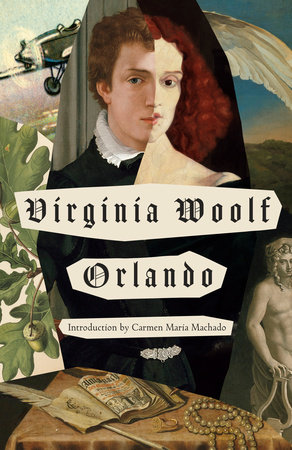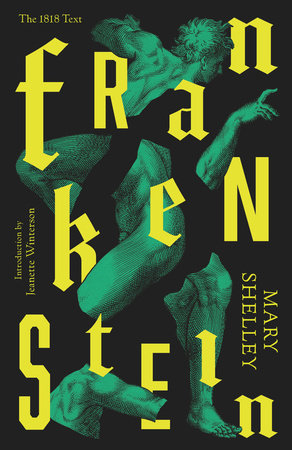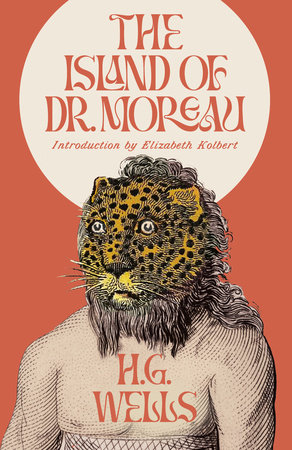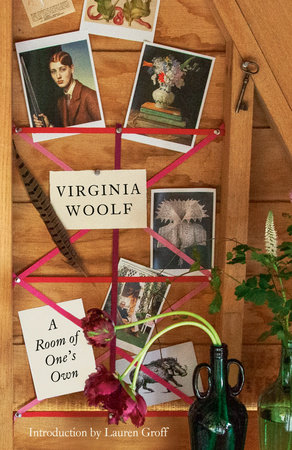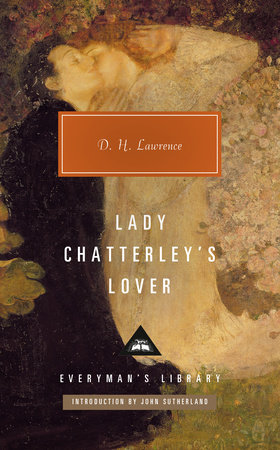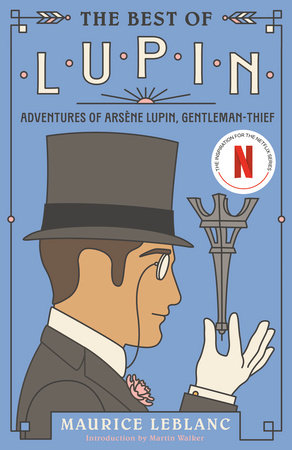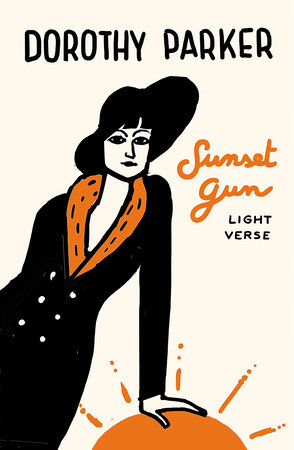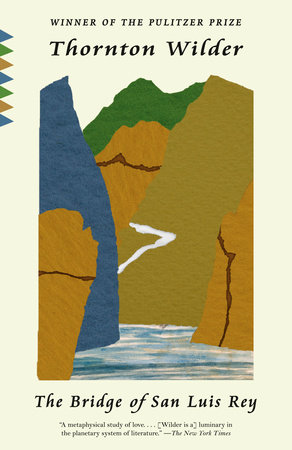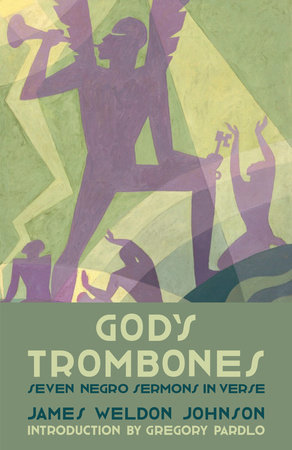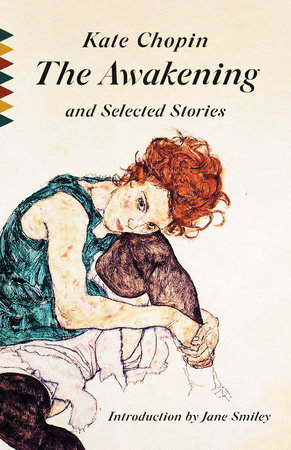Excerpt
Orlando
from the Introduction by Jeanette Winterson
“Yesterday morning I was in despair... I couldn’t screw a word from me; and at last dropped my head in my hands: dipped my pen in the ink, and wrote these words, as if automatically, on a clean sheet: Orlando: a Biography . . . [I]t sprung upon me how I could revolutionise biography in a night...” —Virginia Woolf to Vita Sackville-West, 9 October 1927
It was playful and bold to write a novel as though it were a biography, and to call a fiction a life, and to invent that life around a woman the author was in love with, and to stretch her over 400 years, like a body freed from the problems of gravity.
In
Orlando (1928), Virginia Woolf did away with the usual co-ordinates of biography and set off through time as though it were an element, not a dimension. The story is simple: Orlando is a young nobleman, aged 16, in the reign of Elizabeth I. After a series of adventures and disappointments in love and life and poetry, he takes an appointment as the British ambassador in Constantinople. Aged 30, he wakes up one morning from a week-long dead sleep to find that he is now a woman. Orlando returns to England and discovers that it changes as centuries pass but he, or rather she, continues as before.
Woolf wrote the book at top speed, scarcely pausing, as Orlando scarcely pauses as he races through 400 years. On 11 October 1928 – the last day in the novel – Orlando has reached the age of 36: “The true length of a person’s life, whatever the Dictionary of National Biography may say, is always a matter of dispute.” This is a poke at Woolf’s father, Sir Leslie Stephen, the great and erudite editor of the DNB. The Victorians loved dates and facts, especially dates and facts in order – theirs was the age of classification, of tax – onomy, of the museum, the geographical society, the butterfly net. The pinned wings or the shot and stuffed head are symbols of Victorian England. The Dictionary of National Biography, where the great and the good could be safely pinned and stuffed, was, to Woolf, part of the monstrous edifice of the 19th century that 20th-century creativity needed to overthrow.
As Orlando enters the 19th century she notices, to her dismay, “widow’s weeds and bridal veils . . . crystal palaces, bassinettes, military helmets, memorial wreaths, trousers, whiskers, wedding cakes, cannon, Christmas trees, telescopes, extinct monsters, globes, maps, elephants, and mathematical instruments”. In one of the funniest passages in the novel, Orlando suffers a kind of self-generated electric shock treatment as her left hand takes to convulsing spontaneously. She realises that it is because she is not wearing a wedding ring. She rushes out and finds a husband, and thus subsides the censorious somatic symptom of an age where every woman must be classified as virgin, wife or widow. And male or female.
Woolf was born in 1882. She grew up as a Victorian. Gender roles were strictly observed in society and at her London home in Hyde Park Gate. Her brother Thoby went to Cambridge; Virginia and her sister Vanessa were educated at home. The social doctrine they were raised on was that of “separate spheres” – woman in the home, man in the world – and it was still going strong when Woolf published Orlando, in the year that all female British citizens over 21 finally got the vote.
But Woolf believed that the creative mind is androgynous. She was an expert in Elizabethan literature. She loved both the scope and the certainty of the Renaissance mind. Shakespeare, writing his sonnets to boys and women with equal passion, understanding the manliness of a soldier, the intensity of a nun, seemed to her to be a sign of what we all might be – bigger, wider, freed from convention and hypocrisy.
Woolf met Vita Sackville-West in 1922. Sackville-West was an English aristocrat brought up at Knole in Kent. As a woman, she could not inherit the ancestral home. Woolf, who had fallen in love with Sackville- West’s past as much as her person, found that the family portraits, ancient relics and priceless objects that filled Knole filled her imagination. But Orlando is more than a fantasy or a historical novel; it is highly political. Orlando is a savage satire on sexism.
When Orlando becomes a woman, Knole and all his/her affairs are put into chancery, because a woman cannot be a duke, and a woman cannot be an ambassador to the Turks, and a woman cannot inherit one of the finest houses in England. But a woman can crossdress. Once Orlando becomes Lady Orlando, he must make his skirmishes across gender by dressing up. This he does frequently, in order to meet with life outside drawing rooms and carriages.
Sackville-West often dressed as a man and had affairs with other women in her disguise as “Julian”. She had an affair with Virginia Woolf as herself, and although both women were married the passion between them was real – this is clear from their letters. On Woolf’s side it was deeper while it lasted, because Woolf was deeper, and Sackville- West was an unrepentant flirt. But whatever happened between them affected Woolf’s imagination as well as her heart.
Orlando, written as a romp, a love letter, a gay book in every sense of the word, turned out to be the engine of an exploding freedom in her style. Writing Orlando did Woolf good. Begun as a gift to Sackville-West it became a gift to herself. It is the most joyful of her books. Woolf’s mind was always first-rate, but when she came to write her next book, A Room of One’s Own (1929), she carried across the full-heartedness of Orlando. A Room of One’s Ownis a masterpiece because it is more than a polemic; when she writes about women, about men, about the interplay of the mind, about creativity – above all, about writing – all her thoughts are steeped in feeling. The tract is much more than an argument; it is a passion for life as it could be lived.
Sackville-West, who was not a great writer or a deep thinker, and certainly not a faithful lover, released something in Woolf – something that had been pressing at the bars since Mrs Dalloway (1925). The quality of mind that Woolf (following Coleridge) called “androgyny” is really an adventure of the spirit (think Emily Dickinson). Sackville-West, for all her evening suits and ancestors, did not possess that quality of mind or that adventure of spirit, but she did have a full sexuality and a body to match. It is as though Sackville- West became Woolf’s blood supply for a while. Woolf was never a physical person; with Vita she found herself to be a woman – rather in the way that Orlando does. Sackville- West, all body, allowed Woolf to live in her own body.
It is an entertaining thought to remember that Orlando, all sex- change, cross-dressing and transgressive desire, appeared in the same year as Radclyffe Hall’s sapphic romance The Well of Loneliness. The two novels are different solar systems. The Well is gloomy, beaten, defensive, where women who love women have only suffering and misunderstanding in their lonely lives. The theme is as depressing as the writing, which is terrible. Orlando is a joyful and passionate declaration of love as life, regardless of gender. The Well was banned and declared obscene. Orlando became a bestseller.
Woolf’s wit, her writing, her audacity, smuggled across the borders of propriety the most outrageous contraband. Many of the photographs included in the first edition of Orlando were of Sackville-West. I am still not sure how Woolf got away with all this, but she did.
The exhilaration of the writing has a lot to do with it. It is hard not to fall in love with this book. The writing has a lovely physicality to it. Woolf is always an exquisite detailer but in Orlando the writing is earthed differently. There is something unprotected, even as it is fully conscious. There is a smell of soil, a wave of bilge, the turf is spongy, the rooks hoarse. The unprotected feel of the writing is about speed and energy. Some of that energy is sexual: “Flinging herself on the ground, she felt the bones of the tree running out like ribs from a spine this way and that beneath her. She liked to think that she was riding the back of the world. She liked to attach herself to something hard.”
When Woolf thought about writing she concluded that poets proceed by leaving everything out. The novelist proceeds by piling everything in. How could she both pile in and leave out? Orlando is more cluttered than any of her other novels. At the same time, because she is Virginia Woolf, this pell-mell fling of a book is anti-clutter, anti-collecting, and we find as we read that all these collectables are playthings and chimeras. She vanishes them away in an instant. Centuries pass, the rules of time are ignored, physical boundaries do not matter, even the shabby poet Nick Greene, who insulted Orlando as a young man, is met with again as a fashionable London critic of the Victorian age.
Woolf’s sense of this tremendous freedom of existence clusters in a moment near the end of the novel. The lady Orlando is by the Serpentine watching the toy boats. She has lunched with Nick Greene. She has ordered books from a bookseller – a great novelty for one born in the age of ink-stained manuscripts. She stands at the water’s edge: "It’s something useless, sudden, violent; something that costs a life; red, blue, purple; a spirit; a splash; like those hyacinths (she was passing a fine bed of them); free from taint, dependence, soilure of humanity or care for one’s kind; something rash, ridiculous... ecstasy..." And we are back with the boy Orlando racing through the rooms at Knole, late for the great queen, sinking upon his knees under a hand “attached to an old body that smelt like a cupboard in which furs are kept in camphor”.
We live in a speeded-up world where is it difficult to find 40 minutes, let alone 400 years. Yet, as Woolf observes, time is there for us if we know how to take it. Reading is one way of taking time. Reading takes time, but time is not lost that way, it is repurposed. We find time.
Orlando refuses all constraints – historical, fantastical, metaphysical, sociological. Ageing is irrelevant. Gender is irrelevant. That last is especially interesting now, as the politics of non-binary identification are challenging categories of what is male, what is female, and whether or not biology should be destiny.
Orlando grapples with sexism for sure – but makes it clear that while society regards Orlando very differently after her unexpected sex-change, Orlando themselves does not take that view. Immediately after the transformation, the newly formed Orlando gazes into the mirror and declares ‘Different sex. Same person.’
Orlando is not the first piece of fiction about sex change. Ovid’s Metamorphoses is an equally playful and serious treatise on the mutability of the human form.
The Arabian Nights is stuffed with gender-switches and cross-dressing. Shakespeare’s comedies often pivot round a gender-disguise, and as no women were allowed on the Elizabethan stage, and female parts were played by boys, every romance is also a bromance. It’s likely that Woolf’s title is taken from
As You Like It, where Rosalind, disguised as the shepherd Ganymede, teaches the man she loves – Orlando – how to love in return.
Still,
Orlando is the first trans-novel. Except that Woolf was refusing all labels here. She called it a ‘biography’, knowing it is a novel. She started the postmodern fashion for mixing up fact and fiction, history and invention. We are used to all that now. Woolf was our pioneer.
‘Did you feel a sort of a tug as if your neck was being broken on Saturday last at five minutes to one?’ Virginia wrote to Vita on March 20th 1928. She sent her a copy on publication day, October 11 1928. Their love affair was nearly over by then. Our love affair with
Orlando, the boy who’s a girl who’s a girl who’s a boy,
goes on and on.


